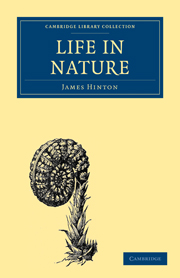Book contents
- Frontmatter
- Contents
- INTRODUCTION
- CHAPTER I OF FUNCTION; OR, HOW WE ACT
- CHAPTER II OF NUTRITION; OR, WHY WE GROW
- CHAPTER III OF NUTRITION; THE VITAL FORCE
- CHAPTER IV OF LIVING FORMS; OR, MORPHOLOGY
- CHAPTER V OF LIVING FORMS; THE LAW OF FORM
- CHAPTER VI IS LIFE: UNIVERSAL?
- CHAPTER VII THE LIVING WORLD
- CHAPTER VIII NATURE AND MAN
- CHAPTER IX THE PHENOMENAL AND THE TRUE
- CHAPTER X FORCE
- CHAPTER XI THE ORGANIC AND THE INORGANIC
- CHAPTER XII THE LIFE OF MAN
- CHAPTER XIII CONCLUSION
- APPENDIX: AN ATTEMPT TOWARDS A MORE EXTENDED INDUCTION OF THE LAWS OF LIFE
CHAPTER VII - THE LIVING WORLD
Published online by Cambridge University Press: 29 August 2010
- Frontmatter
- Contents
- INTRODUCTION
- CHAPTER I OF FUNCTION; OR, HOW WE ACT
- CHAPTER II OF NUTRITION; OR, WHY WE GROW
- CHAPTER III OF NUTRITION; THE VITAL FORCE
- CHAPTER IV OF LIVING FORMS; OR, MORPHOLOGY
- CHAPTER V OF LIVING FORMS; THE LAW OF FORM
- CHAPTER VI IS LIFE: UNIVERSAL?
- CHAPTER VII THE LIVING WORLD
- CHAPTER VIII NATURE AND MAN
- CHAPTER IX THE PHENOMENAL AND THE TRUE
- CHAPTER X FORCE
- CHAPTER XI THE ORGANIC AND THE INORGANIC
- CHAPTER XII THE LIFE OF MAN
- CHAPTER XIII CONCLUSION
- APPENDIX: AN ATTEMPT TOWARDS A MORE EXTENDED INDUCTION OF THE LAWS OF LIFE
Summary
This course of thought became the starting point, in my own mind, of a further train of reflections, which took a wider sweep, and which seem to me to conduct to results of great importance. Let me beg the reader to accompany me a short distance in pursuing it. If our former arguments are sound, the result at which we arrive is this—that not only are the organic and inorganic worlds, which seem to be so different, truly one, exhibiting the same forces, powers, and laws; but life itself, or that which we have called so, appears as a mere result of chemical and mechanical agencies, into the effects of which its most distinctive phenomena are resolved. We find no special power which we can call by that name. May it not, then, be urged that we have grasped at life, and it has escaped us? Those processes which we find in its place are not what we sought—are not what we can recognize. Life on this view is not explained; it is denied. It is true that it is made universal, but in that very universality the thing itself is lost. The passive processes which are substituted for it present not one of the characters which we seem to feel and know in life—fulfil not one of our instinctive affirmations respecting it. Have we not analyzed it into nonentity? — found the fair seeming fruit to be but ashes?
- Type
- Chapter
- Information
- Life in Nature , pp. 155 - 168Publisher: Cambridge University PressPrint publication year: 2009First published in: 1862



